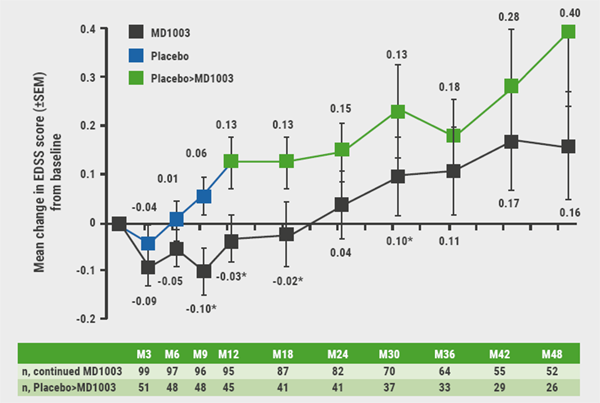Dr David Dodick (Mayo Clinic, Phoenix, USA) stressed that there is underrecognition of cluster headache and a high rate of misdiagnosis that delays the correct diagnosis an average of 5 to 7 years. “Effective acute treatments are underused, and there are no approved medications for prevention.” Presenting results from the double-blind treatment period of this trial, Dr Dodick said participants were randomised to subcutaneous galcanezumab 300 mg (n=49) or placebo (n=57) once monthly. The primary endpoint was the overall mean change from baseline in weekly attack frequency across weeks 1 to 3. A significant difference was found: -8.7 for galcanezumab versus -5.2 for placebo (P=0.036). The key secondary endpoint, the proportion achieving a ≥50% reduction in weekly attack frequency at week 3, was also significantly higher (76% vs 57%; P=0.04).
Dr Dodick pointed out that the Patient Global Impression of Improvement (PGI-I) was significantly better after 4 weeks in the active treatment group, but not after 8 weeks. “This likely reflects the typical spontaneous resolution of cyclic cluster headache after some weeks.” Galcanezumab was generally well-tolerated. There was a low incidence of discontinuation due to adverse events, with no clinically meaningful differences between galcanezumab and placebo in safety parameters except for a higher incidence of injection site pain (4 patients in the galcanezumab arm versus 0 in the placebo arm). He could not say if any of the other available anti-calcitonin gene-related peptide antibodies may be effective in cluster headache.
1. Bardos JN, et al. AAN 2019, Plen02.004.
Posted on
Previous Article
« OV101 (gaboxadol) as therapy of Angelman syndrome Next Article
McDonald Criteria MS often misapplied and misunderstood »
« OV101 (gaboxadol) as therapy of Angelman syndrome Next Article
McDonald Criteria MS often misapplied and misunderstood »
Table of Contents: AAN 2019
Featured articles
Letter from the Editor
Interview with Prof. Natalia Rost
Alzheimer's Disease and other Dementias
Amyloid PET in cognitively impaired patients
Tight blood pressure control lowers risk of mild cognitive impairment
Epilepsy
Headache and Migraine
Multiple Sclerosis and NMOSD
Immune tolerance by peptide-loaded tolerogenic dendritic cells
Biotin, ocrelizumab, and ibudilast in progressive MS
No increased MS relapse risk postpartum
Neuromuscular Disorders
First-ever effective and safe treatment of CMT1A
Parkinson’s Disease and other Movement Disorders
Leukaemia and hypertension therapies tested in Parkinson’s disease
Stroke
Miscellaneous
Possibly lifesaving therapy in refractory PML
New AAN guideline for treating Tourette syndrome
Subspecialty teleneurology: feasible and highly valued
Related Articles
July 30, 2019
Updates on three treatments of spinal muscular atrophy
July 30, 2019
New formulation of rimegepant: fast onset of action

July 30, 2019
Biotin, ocrelizumab, and ibudilast in progressive MS
© 2024 Medicom Medical Publishers. All rights reserved. Terms and Conditions | Privacy Policy
HEAD OFFICE
Laarderhoogtweg 25
1101 EB Amsterdam
The Netherlands
T: +31 85 4012 560
E: publishers@medicom-publishers.com

